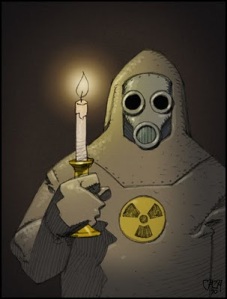
“How can we get people to act now?”
This was the question that American climate scientist Kevin Gurney was asked to respond to on The Young Turks, a news and political commentary show (the question is shortened and rephrased for the purpose of this post). Prior to this simple yet incredibly loaded question, Gurney had thoroughly explained the scientific reality of climate change, that its impacts would primarily be perceptible and felt much later, but as a result of our behavior today, and that these impacts had an irreversible and exponential quality in the case of insufficient preventive action.
Despite the build up and the urging of host Cenk Uygur to produce a gripping end to his show, Gurney’s answer to this question was full of sobriety, intellect and caution, all endemic to the scientific community on climate change. There was nothing shocking, nothing new. Nothing that wasn’t already a consensus within the scientific community and within most of the world’s policy and decision-making community. Gurney simply and correctly reiterated that it was best to act now because later it would be extremely difficult.
Yet, in the United States, there is hardly any federal action to tackle climate change:
191
This is the number of times the US House of Representatives of the 112th US Congress voted against legislation to protect the environment. Representatives Henry Waxman, (Democrat-California), Edward Markey, (Democrat-Massachusetts), and Howard Berman, (Democrat-California) detailed in a report this record number of times that the House reflected how it was “the most anti-environment House in history”[1].
In American public opinion, there is relatively little belief in the urgency of climate change:
77 to 65
This is the drop from 2007 to 2011 in the percentage of Americans who believe climate change is a serious threat, according to the Worldwatch Institute.
72 to 58
This is the drop from 2008 to 2010 in the percentage of Americans who believe that global warming exists, according to the Brookings Institution.
From these two polls may also be interpreted slightly more acknowledgement of the terms “climate change” than “global warming.”
First and foremost, there is now barely any talk of climate change in American politics:
1, 0 and 0
These are the numbers of times “climate change” is mentioned respectively in
President Barack Obama’s State of the Union address, the Republican primary debate in South Carolina on January 19th, and the Republican primary debate in Florida, January 23rd (all in 2012).
0, 0 and 1
These are the numbers of times “global warming” is mentioned respectively in the same three events.
There is something to be said about the right language to inspire and drive action against a problem. As mentioned above, the problem of “climate change” seems to be more acknowledged than that of “global warming.” We can then observe some strategic choices of language in the discourse of American politicians.
In the Florida primary debate, Senator Rick Santorum used the words “global warming” to criticize Governor Mitt Romney and Speaker Newt Gingrich’s past support for a cap and trade system. According to Santorum, belief in climate change is not consistent with Republican values. In contrast, when President Obama attempted to justify action against the problem, he utilized the terms “climate change” in his speech, arguing in favor of considerable investment in efficiency and innovation in energy.
In a country where using shock tactics to encourage action is common practice, it is as if the more alarmist terms “global warming” have had the opposite effect: inaction. They seem to be associated with and used to reinforce the controversy of the science, of the belief, and of the need to actively address the problem. “Climate change,” as demonstrated by President Obama, are words used more often when attempting to convince of the opposite.
Regardless, in the past few years, both “climate change” and “global warming” have almost disappeared from discussions in American politics. I had the privilege with other CliMates to discuss the issue with CliM’Angel John Ashton, who accurately spoke of the “toxification” of the words “climate change” and “global warming” in the United States. In the context of heated debate on the economic crisis and controversial Obamacare, “global warming,” terms made famous in the United States by Vice-President Al Gore’s documentary An Inconvenient Truth, signify a different crisis that has become almost irrelevant and impossible to take on at the moment, one that may imply culpability of the American way of life and that is excessively a claim of the democratic party, for which the party is often attacked.
In November, I attended a conference at the French Development Agency just before the climate negotiations in Durban. I asked Paul Watkinson of the French Ministry of Environment and lead negotiator on the French delegation in climate negotiations: “As we try to couple climate change mitigation and adaptation strategies with those to emerge from the economic crisis, should we also be talking about a ‘climate crisis’?” Watkinson dismissed the question, answering that referring to the predicament as a “crisis” would worsen the immobilization of people’s efforts.
In his State of the Union Speech, President Obama deftly brushed over the climate change issue and inspired action by focusing on non-controversial issues in the United States: energy independence, energy efficiency, and technological innovation.
It is from this point that I will draw inspiration.
Whether you believe in climate change, global warming, and whether you believe they are anthropogenic or not, it is difficult to argue against our dire need to better manage our natural resources. It is difficult to argue against more efficient and more equitable use and distribution of these natural resources. It is difficult to argue against the behavior of one not having negative effects on the lives of others.
This is what action against climate change means: recognizing that our behavior, on a daily basis, at the local level, at the level of each individual, is connected to someone and something else, for example to a whole chain of production and of extraction of finite resources, and to other people with whom we share these resources and this activity.
As climate change is one of the most inter-disciplinary sciences, and therefore gives a chance for experts and people of all backgrounds to work together to solve it, it is even more a science for all people and nations to work together to solve it. And there is room for leadership, for political creativity in the language that is used.
And this is where I believe we can go much further than President Obama has. Climate change means “international cooperation”.
“Countries helping each other out”.
“Countries working together”.
“People working together”.
Ambiguous jargon of climate change international negotiation texts, to be sure, is part of the problem. Maybe Agenda 21 should be called instead “Project: Countries smile at the planet together.”
Perhaps a bit corny, and needless to say this last expression was not mentioned in any of the political speeches that I referred to above. However, it is somewhat shocking that “international cooperation” wasn’t either.
Certainly tackling climate change will require financial investment. Certainly it will require consuming differently. But the positive effects from addressing an issue that encompasses so many others would largely outweigh the negative effects. “Health benefits” from reduced climate change are undeniable. “International security” and “economic stability” would benefit from less climate change induced migration, and from better preparation for environmental disasters.
This is what tackling climate change means: “solving other problems, improving other situations”. There is a need for “leadership”, and through this leadership the costs and sacrifice that are habitually associated with tackling climate change can be interpreted differently.
Paul Watkinson was right. Climate change is not a “crisis”. Let’s stop fearing the problem, and start calling and recognizing climate change as what it is: “an opportunity.”
[1] Henry Waxman, D-California






 Image source : Philippe Caza,
Image source : Philippe Caza, 

